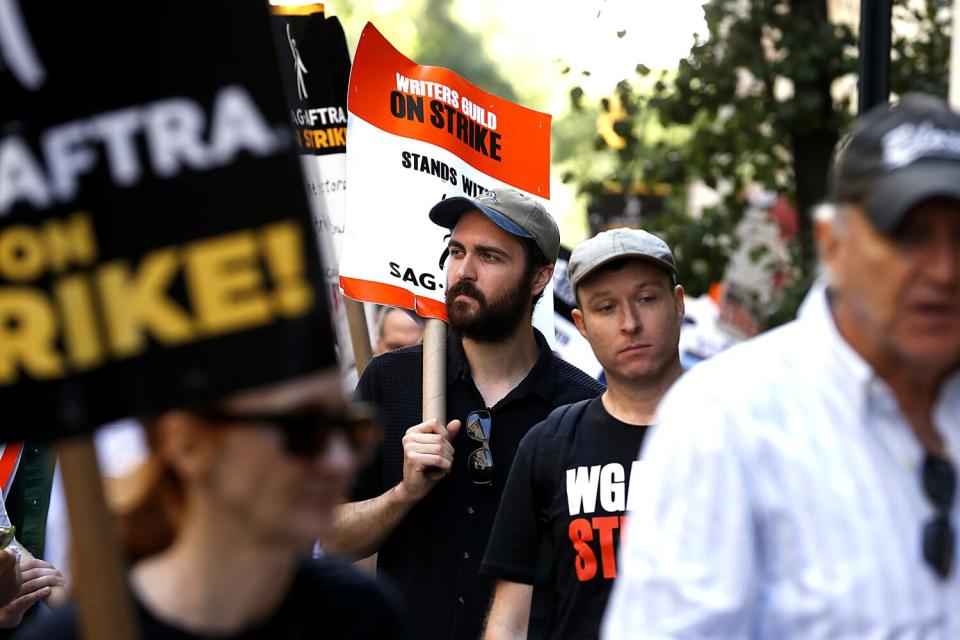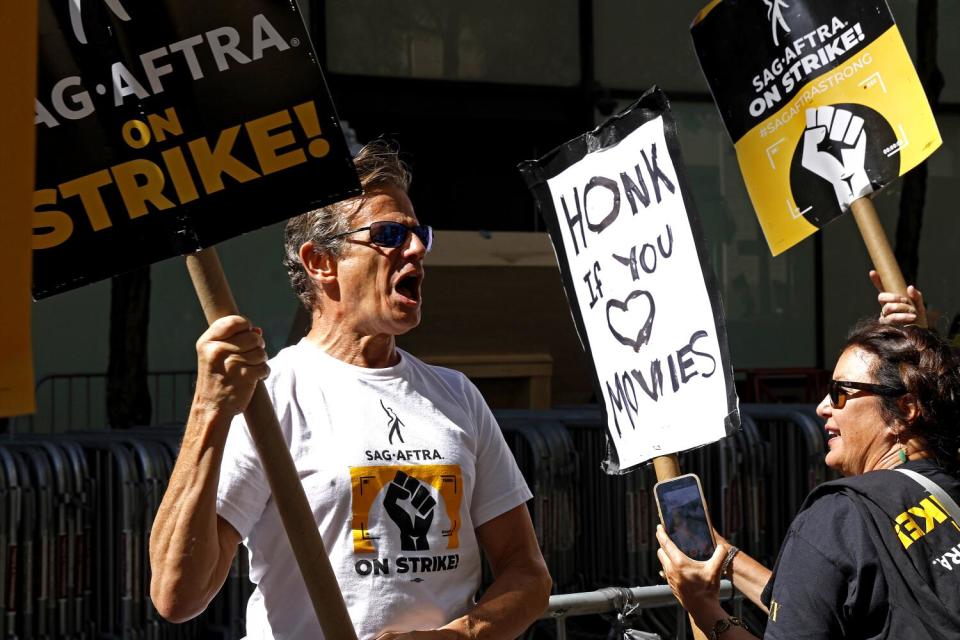Column: Hollywood studios have already lost the strikes. Now it's time to surrender

Don't start a fight unless you are certain you can win it.
How many times does Hollywood have to tell this story, in fiction and non-, before the people who run the entertainment industry understand it? Do they even watch anything they make?
Whatever short-term financial gain the studios represented by the Alliance of Motion Picture and Television Producers hoped to gain by forcing the first dual strike of writers and actors in 40 years has long since been overshadowed by all that they are losing.
Public support, brand loyalty, individual reputations and group unity, not to mention, as the strikes threaten the fall TV lineup, theatrical release calendar, film festivals and the Oscar race, months' — perhaps an entire year's — worth of profit and prestige.

The writers and actors have already won the battle of solidarity and righteousness; the question now is how long before the studios get over themselves and make a deal.
It would be great to say something sensible like "a week," but given the unfiltered arrogance, shocking hostility and general bone-headedness the studios have displayed thus far, it's difficult to know. They could double themselves down into a 2024 with few new series and the least surprising Oscar race in history ("Barbie" versus "Oppenheimer," Round 2.)
Read more: Why Hollywood's labor nightmare won't end soon: Frustration, fear and mistrust
Every attempt the AMPTP has made to control the negotiations or the public narrative has backfired. After the Writers Guild of America went on strike in May, "tough" talking from anonymous executives about how they were in it to win it even if it meant writers losing their homes only served to strengthen the writers' unity.
And help set a fire under the Screen Actors Guild-American Federation of Television and Radio Artists, which went on strike in July.
Comments from Netflix's Ted Sarandos, who said the streamer would just lean into international content, and Disney's Bob Iger, who lectured strikers for their unreasonableness, resulted in a swell of picket lines and sympathy from every employee who has seen American jobs move overseas or heard how their wealthy bosses simply could not "afford" to offer single-digit percentage raises.
Read more: Column: The studios thought they could handle a strike. They might end up sparking a revolution
Yet, despite polls indicating that a clear majority of Americans support the striking guilds, the AMPTP has portrayed the studios as the injured parties: We thought we could make TV without advertising, which obviously we couldn't, but it's not our fault.
Last week, in an obvious attempt to divide Writers Guild of America members, and potentially violate labor law, the AMPTP made public its most recently rejected contract proposal.

As if that would prove how hard they were trying to deal with those "unreasonable" writers.
That too backfired, so quickly and clearly that the studios scrambled to hire a new PR firm.
You know what would be the best PR right now? Ending the strikes.
Because it isn't the guilds that are divided at this point, it's the studios; on Wednesday, many of their heads met in an attempt to sort out what has been characterized as increasingly frantic infighting.
Read more: At festivals like Venice and Toronto, striking actors face 'court of public opinion'
Meanwhile, the Venice Film Festival kicked off with its few stars making comments (and wearing T-shirts) in support of the strike, with the Telluride and Toronto film festivals likely to repeat the pattern. And Netflix may continue to boast of the viewers it's attracting with old series including "Suits" and "Ugly Betty," but if reruns are your business plan, you need a new business plan.
The WGA's rejection of the AMPTP's latest proposal, which did not offer meaningful concessions in several key areas, proves that the writers are not going to back down on demands that make television writing an economically sustainable profession.
You know, like it should be.
At this point, it's difficult not to see the studios' recalcitrance as pure ego. AMPTP members, once a collection of studio heads, now include people who oversee empires — emperors.
Amazon and Apple may like to win Oscars and Emmys, but they're not dependent on entertainment for profit. Even older media companies are now in the business of ditching shows, some before they even air, in order to take a tax write-off.
As I have noted before (and screamed into my pillow on a daily basis), everyone in, and out of, the industry has known for years that writers and actors would demand exactly what they are demanding when their contracts expired.

Everyone knew streaming platforms broke the traditional business model of television and film at the expense of those who actually make television and film even as the salary gap between the executive suite and the soundstages had widened to "Meg 2: The Trench"-like proportions.
Did they think the WGA and SAG-AFTRA weren't going to rise up, teeth gnashing, in response?
Read more: How strikes could shake up the Oscar race: 'People are terrified about the optics'
I deeply fear that, like so many of the conniving and oblivious characters we love to despise, the studios thought they could use chaos to their own advantage and then call it back when they were done. Sure, let the writers strike; we'll use the shutdown to burn off certain contracts and projects, and goose quarterly reports before offering the guilds just enough (but not too much) to send everyone back to work.
Except it has not worked out like that. At all.
Now, after major victories by UPS workers and airline pilots, among other groups agitating during this "hot labor summer," what the AMPTP has so far treated as concessions can be recognized for what they are: lowball offers. And as both the WGA and SAG-AFTRA have proved, they are not interested in half measures of that sort, especially as the writers' strike heads into its fifth month. Why would they? No writer or actor wants to be forced to strike again in another four years, and the only way to prevent that is to make reasonable gains on all the key issues this time around.
Which, if they are the great business minds they claim to be, the studio heads should understand.
So far, however, they continue to insist that down is up, wrong is right and all they need to get through this is a better PR team.
Guys, you've lost the war. The best thing to do now is negotiate the terms of surrender.
This story originally appeared in Los Angeles Times.


